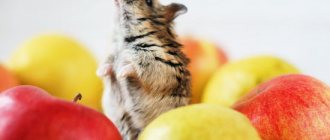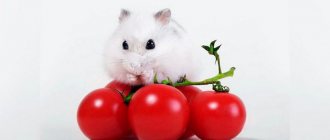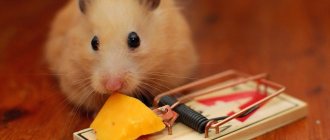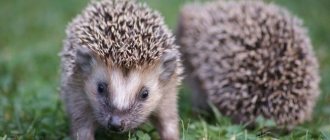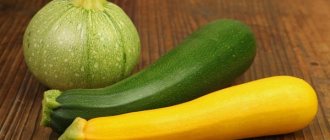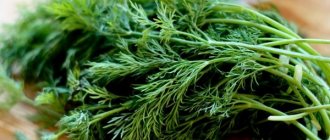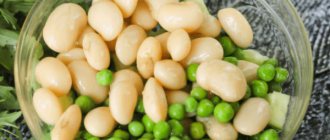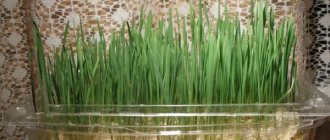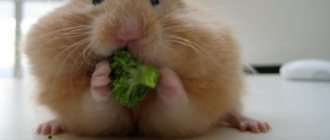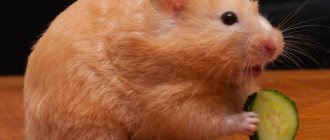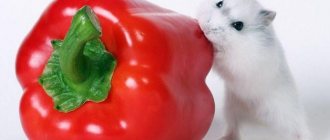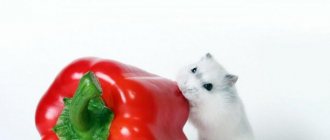There are probably no people who don't like hamsters. These cute, cuddly rodents run around their cage with great enthusiasm and spin happily on the wheel. How funny it is sometimes to watch how a hamster hides nuts and grains in its cheeks. These cute animals have been living next to humans for quite a long time. They are easy to train, quickly get used to their owners and do not take up much space for their residence. Hamsters are most often taken as pets. They do not require walks in the fresh air, move only within the territory of their cage, eat little and practically do not smell.
Hamsters
Most often, hamsters of the Djungarian and Syrian breeds are sold in pet stores. Although now you can also find Angora, furry animals. But these are already the fruits of human selection work. Syrian hamsters have golden fur. Body length can reach 20 centimeters. Dzungarian individuals are smaller than their Syrian relatives. Their body length is up to 10 centimeters, and their color is distinguished by several dark, almost black stripes running along the back. Both breeds of hamsters are undemanding in terms of living conditions.
You just need to install a sufficiently voluminous cage, lay down sawdust or a special filler, install a feeder, a drinking bowl and a play wheel for physical exercise.
What kind of apples can you give?
Hamsters can eat apples and even need them, but on the condition that the fruits are fresh:
- will be ripe;
- not treated with chemicals and various growth stimulants;
- before offering such food to a rodent, it must be thoroughly rinsed under running water;
- It is recommended to soak fruits purchased at the supermarket in water for several hours to neutralize the effects of pesticides.
Offer your pet apples of sweet and sour varieties. They are more useful and do not have a negative effect on the animal’s gastric mucosa. Can hamsters have sweet apples? Fruits with a high content of sucrose are harmful for such a pet. They can provoke the development of diabetes and related diseases.
You can give hamsters apples, but only after they reach one month of age. At an earlier age, eating this fruit can cause diarrhea, vomiting and gastrointestinal upset.
When offering this product to your furry, do not forget that it contains seeds. Fruit pits are contraindicated for hamsters because they contain a toxic substance - hydrocyanic acid. Therefore, before giving them to the animal, cut them in half and remove the entire core of the fruit.
Both Syrians and Dzungarians can eat apples. Almost all breeds of the Hamyakov family can eat this delicacy with great pleasure.
Dried apples
Many livestock breeders are interested in whether hamsters can eat dried apples? Of course you can! The hamster will be happy to eat such a treat. The main thing is that the drying is prepared correctly, and always without adding sugar and salt. In dried form, such a product does not lose its valuable properties and qualities. Dried apples normalize metabolic processes and prevent the development of gastrointestinal diseases.
Baked and stewed apples
As for baked and stewed apples, it is not recommended to give them to your pet. This product is of little use to your pet hamster. In addition, it can cause discomfort and pain in the stomach and intestines. As a result, your hamster may experience vomiting, nausea, and diarrhea.
Nutrition
How to feed these little rodents? Can hamsters eat bananas? Now let's try to understand these issues.
The main rule for an active life and health of hamsters is the correct composition of feed and adherence to basic nutrition. What should be included in an animal's diet? Be sure to have grain crops: wheat, rye, oats. You should not remove nuts from your diet. After all, they contain a large amount of healthy fats and amino acids. But it is best to exclude sunflower seeds from the small animal’s diet; the presence of a large amount of oils in them has a bad effect on the hamster’s liver. Your little friend will not refuse green herbs such as dandelion, lettuce, parsley and dill.
The hamster loves carrots, apples and beets. Once a week you can give the animal a piece of chicken or beef. But you should not give the product raw. This makes the animal more predatory and carnivorous. To introduce protein into food, you need to add boiled quail eggs in small portions, pieces of cottage cheese to the main food, or pour yogurt into a bowl. Fermented milk products are, in principle, very beneficial for hamsters. But at the same time, it is not the main food in the wild. Therefore, you should not give them too often, just like meat pieces, once a week is enough.
About fruit exotics
Tropical fruits on our tables no longer surprise anyone. We have already rated avocado, pineapple, and kiwi. And, naturally, the question immediately arises about them. Since the question of whether bananas can be given to hamsters has been answered positively, does this also apply to other tropical fruits? Unfortunately no! Pineapples, avocados, kiwis, and persimmons are contraindicated for hamsters. And citrus fruits too, because they contain a lot of acid, which is harmful to this most delicate creature - the hamster.
The exclamation “alas” refers to the owners. Hamsters have nothing to do with all this exoticism, and there will be no regrets on their part. In the life of small domestic rodents there are other joys, including food. They will somehow manage without this exoticism.
Do not forget about maintaining the correct diet for rodents. After all, the health of your little animal largely depends on what it eats.
Banana in the diet of adult hamsters
Since we are talking about dessert, many hamster owners ask the question: can hamsters have a banana? The answer is yes. You can, but not include it in the daily menu, but only sometimes give this fruit for breakfast or, in other words, in the first feeding. Banana is a soft fruit with a high sugar content. Everything that this fruit contains is beneficial for the animal, but not in large quantities. For example, sugar helps a hamster be much more active and cheerful.
But daily intake of sugar leads to obesity and diabetes. The starch contained in bananas and the large amount of fiber help the pet's intestines function properly. Based on the above, it will be possible to answer the question posed about whether hamsters can have a banana. Yes, the animal is allowed this fruit. But only occasionally.
How to eat pomegranate correctly
Pomegranate seeds contain complex carbohydrates or polysaccharides: starch and fiber. These substances are needed by the gastrointestinal tract for the functioning of its peristalsis and the removal of toxins. Due to enzymes, the bones are partially digested, and the intestinal microflora completes the work.
There are different varieties of pomegranates and there are fruits with soft or small seeds. But the contents of the fetus can also be tough, because this cannot be determined in advance. Therefore, whether it is possible to eat pomegranate with seeds is up to everyone to decide for themselves. Some people prefer to eat the whole grain, while others try to get rid of the seeds by squeezing only the juice. Both options have a right to exist and will not cause harm to health.
How to eat pomegranate correctly? Before eating, the fruit must be cut so as not to damage the contents and prevent loss of beneficial juice. If you cut the fruit with a knife, then part of the tasty product is lost. We carry out the cutting according to the rules:
- cut off the place of the inflorescence with a knife;
- make small vertical cuts;
- Place the fruit on a flat surface;
- press with your hand and the fruit breaks into several slices;
- separate each slice;
- We eat a piece at a time for our pleasure.
There is another option for obtaining delicious pomegranate seeds. Place the fruit in water and cut off the top part under water, peel the peel and select the grains with your hands, wash the peeled seeds using a sieve.
Banana in the diet of babies
Is it possible to give banana to very small hamsters (less than a month old)? At this age, this fruit should not be fed to rodents. The fact is that banana has a soft structure. And when consumed by an animal, the fruit sticks to the roof of the mouth, making breathing difficult, and the animal may die from suffocation. By the way, is it possible to give natural banana chips? In this case, the fruit becomes quite hard. Then the fruit is useful for the animals. Is it possible to give banana to female hamsters if they are expecting offspring? No. In this case, there is no need to treat the animal with such a treat. The fact is that a banana can cause bloating in the tummy. And this will lead to the loss of offspring.
The benefits of fruit for rodents
The composition contains a large amount of vitamins and microelements.
Magnesium and potassium have a positive effect on the animal’s musculoskeletal system, its cardiovascular, nervous and urinary systems.
Iron increases hemoglobin content, helps relieve fatigue, hunger and restore strength.
Phosphorus is necessary to strengthen the animal’s bones and teeth.
The main thing is to use the product in moderation. Digestion is normalized, the blood vessels in the rodent’s body will become flexible and elastic.
Morning time is most favorable for eating fruits. When choosing a banana for your pet, pay attention to the peel. It should be yellow and strong. Rotten, blackened fruits should not be given.
You can start feeding your pet these fruits in the second month of life.
Whole fruit
Is it possible to give hamsters a whole banana? No, the fact is that such a fruit is quite large in size in relation to the hamster’s body.
Therefore, the animal simply cannot cope with so much food at once. The remaining banana begins to quickly deteriorate and can cause poisoning to the animal. In everything it is best to know when to stop and not to overfeed your beloved fluffy.
Drinking fountain
Such a device can serve not only to quench the thirst of animals, but also become an original accent in the home interior. The design consists of a water bowl, a filter, a diffuser and a drinking bowl located at the top. Additionally, it is equipped with a decorative sprinkler, especially popular with native breeds (Maine Coons, Kuril Bobtails, Siberian cats).
Continuous circulation of liquid is ensured by a mini-pump powered by a USB cable. More advanced models may contain backlighting and an indication of the level of remaining water in the tank.
Cost – 2400 rub.
Various hamsters and banana
Can dwarf hamsters eat bananas? Yes. It’s possible, they also love this sweet delicacy and are unlikely to refuse the gift. The main thing is to follow the basic rules of feeding the animal.
Can Syrian hamsters have a banana? The answer is yes. Another rule when feeding hamsters is that they need to be given roughage daily. After all, your pet’s teeth grow throughout its life, and it grinds them down while feeding. For prevention, it is also necessary to give special mineral stones, which are sold in pet stores, and small tree branches. However, before giving them to the animal, they should be thoroughly washed under hot running water. You cannot feed branches of trees such as bird cherry, cherry, and oak. These plants contain a fairly large amount of acids and tannins; they taste bitter and the rodent will not like.
Contraindications
Hamsters are used to hard food, and banana is a soft berry. A viscous sticky mass forms in the mouth, which enters the breathing tube. Fruits contain substances that cause an allergic response.
The pet experiences the following painful symptoms:
- the hamster is constantly itching;
- eyes turn red;
- breathing quickens;
- wool falls out.
The hamster gains weight, loses mobility, sleeps a lot, and refuses to communicate with its owner.
Is banana allowed in the evening?
Is it possible to feed a hamster banana in the evening? No. It is best not to give dessert in the evening. The fact is that hamsters are nocturnal animals. Therefore, it is at this time that they begin their active life. The presence of sugar in the night feed will make the hamster especially active. And he simply won’t let his owners get enough sleep with his noise.
Is it possible to give a Djungarian hamster a banana instead of regular food? No. Such food is not for a regular feeding diet. Bananas are given in small quantities, no more than once a week. Moreover, the pieces should be no more than 5 grams per feeding.
What can you give?
Hamsters can easily eat oats. But they eat rice only in limited quantities. Corn, wheat, rye and barley can be given without a doubt. But buckwheat and lentils can be used only in small quantities. As for berries and fruits, they can be given both fresh and dried.
All fresh fruits are cleaned of seeds and seeds in advance. Without these components, such food does not pose any danger. It is worth considering that the bulk of juicy fruits are rich in carbohydrates and glucose. Therefore, a strict limitation is imposed on the quantity of such ingredients.
Their maximum share in the daily menu should not exceed 5%. Otherwise, the hamster's life is at risk. Fruits and berries are accumulated in advance. Both dried and frozen preparations are suitable. Dried fruits (bananas, dried apricots, raisins, dates) are soaked for 3 or 4 hours before being placed in the feeder.
Juicy food of any type must be thoroughly washed. In addition, we must try to remove as much pesticides and nitrates as possible. To do this, you will have to soak the greens and peel the apples. Djungarians love:
- oatmeal;
- buckwheat;
- barley;
- oats;
- beans;
- sunflower seeds;
- pumpkin and melon seeds;
- Walnut;
- peanuts and hazelnuts;
- sprouted wheat;
- sprouted oats;
- cashew nuts.
It is quite reasonable to feed Djungarian hamsters with sprouted alfalfa. Recommended green plants include nettle leaves, clover, basil, and celery. It is appropriate to use dill and pea pods in their entirety. Vegetables such as:
- broccoli;
- cucumber;
- carrot;
- cauliflower;
- tomato;
- turnip;
- beet;
- pumpkin;
- radishes and other crops.
Good berry and fruit crops include plums, peaches, pears, cherries, gooseberries, grapes, cherries, and rose hips. Both blueberries and apricots go quite well. A hamster's teeth are strong enough for the animal to eat small twigs and bark of deciduous and fruit crops. The main “candidates”: cherry, apple, poplar and maple.
Beech, willow and birch twigs, pieces of the bark of these trees are also suitable for rodent food. He will be able to sharpen his teeth on such solid food.
Protein dishes should be added to the hamster’s diet every 2-3 days. The best options: boiled chicken, boiled eggs (quail eggs are also acceptable), worms from a pet store or dug up yourself, shrimp. Some hamster breeders use yogurt (only without any additives) and low-fat varieties of cottage cheese.
Alfalfa and timothy will provide hay for your hamster. Such food will provide the animal with plant fiber.
Banana during hibernation
Can Djungarian hamsters have a banana during hibernation? After all, it is in winter that this breed of hamster goes into hibernation. Therefore, it becomes inactive. The presence of a banana in the diet can adversely affect the functioning of the digestive system, which at this time acts much more slowly than in the summer.
Hamsters are active animals, and they often enjoy not only running around the cage, but also performing acrobatic acts. To do this, you just need to put a small running wheel and several ladders in the cage. All this will be instantly checked by the pet, and you can often watch the hamster exercise in the evening. It would be nice to purchase a special transparent ball. A hamster can be placed in it, and you can let it travel throughout the apartment. During the day, an animal can run across the entire living space and at the same time be in front of its owners.
List of prohibited products
You should not give white cabbage to dzungarians to eat, it causes increased gas formation and is difficult to digest.
There have been cases when it caused the death of a poor rodent. Limit khoma from potatoes, they are too hard to digest and can contain huge amounts of pesticides, plus they have too much starch. Remember that any branches of fruit trees collected in the city can seriously harm the dzhungarika, having a detrimental effect on health. Given our ecology, this fact does not even require explanation.
Good quality twigs can be purchased at pet stores, but be sure to heat them before giving them to your rodent.
Under no circumstances give Djungarian hamsters food from your table. Fried, fatty and floury foods are very harmful to his health.
Below, in the list, we will take a closer look at the foods that should not be given to Djungarian hamsters, these are:
- Salt.
- Pepper.
- Sugar.
- Honey.
- Onion.
- Watermelon.
- Sour cream.
- Chocolate.
- Kiwi.
- Pomegranate.
- Mint.
- Sorrel.
- Cherry or apricot pits.
- Coniferous tree branches.
- Sausage.
- Bread.
- Cookie.
- Pasta.
- Garlic.
- Almond.
- Milk.
- Cheese.
There is a lot of debate about foods that should or should not be included in a hamster's diet, with one half arguing for harmlessness or healthfulness, and the other taking the opposite point of view. These products include beets, radishes and bananas.
In any case, the choice will be yours; if you have concerns about giving this or that food, it is better to refuse than to reproach yourself for what you have done. After all, the list of products that are completely harmless for Djungarian hamsters is quite extensive.
Owners' opinions
People who have hamsters say that they are omnivores. Sometimes they may even eat something they shouldn’t, such as smoked sausage or chocolate. Can hamsters have a banana? As we have already found out, yes.
The owners say that this fruit can be given to hamsters, but little by little. The owners also advise: you need to monitor the condition of the pet. If, after consuming a new fruit, you notice any signs of illness in your animal, then you should not give this fruit to your rodent.
What kind of strawberries can I give?
Strawberries should be given to your pet rodent of good quality. It must be mature and free of damage or rot. You should discard this berry out of season, since production that is too early often contains excess nitrates, pesticides and growth stimulants. It can be treated in a store or market with drugs for long-term storage.
It is best to use produce from your own garden. If this is not possible, then it is recommended to buy products from local producers during the season, rather than imported ones. Before giving to a pet, strawberries should be washed, sorted and peeled.
Important! In winter and spring it is useful to give berries that have been frozen. They retain the bulk of useful elements and replenish the lack of vitamins during this period
Some tips
To arrange the animal's cage, it is worth remembering that hamsters are burrowing animals. Therefore, they need a shelter where they can rest in silence and make their supplies for a rainy day. Cleaning the cage should be done every two days, cleaning out all contaminated areas of the bedding and spoiled supplies. The feeder should always be filled with food, and the drinking bowl with fresh water.
Hamsters rarely live in pairs. They do not like it when strangers enter their territory. Therefore, you should not get a couple of hamsters and keep them in the same cage. To breed rodents, the female and male are kept in separate cages and only brought together at the time of mating. Born babies are separated from their mother 2-3 weeks after birth.
That’s probably all that future and current owners of cute creatures – hamsters – need to know. Taking care of such a small creature will bring a lot of positive emotions and pleasure.
Pomegranate seed tincture
Pomegranate tincture is easy to prepare at home. It contains alcohol (vodka, moonshine), pomegranates, lemon, cinnamon, granulated sugar. What the body lacks can be supplemented with a tincture, which has excellent taste and benefits.
Its regular consumption helps:
- reduce the number of cholesterol plaques;
- carry out prevention against infections;
- relieve inflammatory foci of various nature;
- relieve premenstrual condition.
To feel good, it is enough to consume 1 tbsp. l. before meals twice a day and drink for 2 months. The tincture is stored in the refrigerator and taken for a maximum of 3 months (it cannot be stored longer).
Traditional plastic carrier
Perhaps the most common way to move small animals. Very well suited for long-distance travel, but in a car (and especially on a bicycle) a bulky plastic box is not very convenient.
Among the advantages, we note excellent breathability, ease of cleaning and maintenance, the ability to organize meals while traveling, hygiene, strength and durability.
The disadvantages are determined by the need to allocate space for storing this box and, of course, the outdated design. It is necessary to have such a device in stock, but it is not very suitable for short-term forays outside the city.
Cost – 1,146 – 2,137 rubles.
Choosing a variety
Which variety to choose for dzungaria and do you need to process the fruits? There is no need to choose varieties that are too sweet; your pet will like them, but they can be harmful to health. Too sour fruits are also not suitable; ripe, moderate-tasting fruits are best. If you choose a fruit that is not ripe enough, the animal may have digestive problems.
Regarding processing, the rules are:
- Store-bought apples must be peeled; the fruits may be treated with chemicals. This condition especially applies to fruits purchased in winter. In cold weather, it is better not to buy them for your pet.
- Homemade fruits must be washed.
- Dried apples are better for winter. Soak them in water before giving them to your hamster.
- Fruits must be washed thoroughly under running water.
